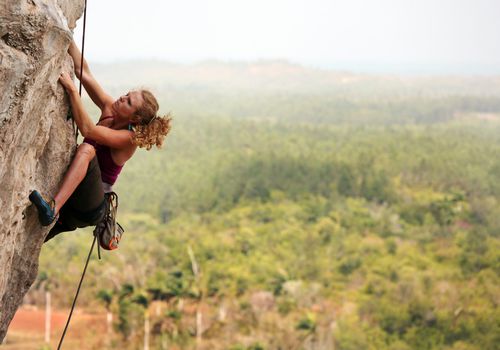In the iconic movie Point Break, Keanu Reeves’ character, Johnny Utah, plays an FBI agent tracking serial bank robbers in Los Angeles. He finds out that the gang surfs in their spare time. They’re adrenaline junkies, and they enjoy chasing the next high.
Reeves infiltrates the gang and ultimately takes them down, but in doing so, he learns something about himself: he’s an adrenaline junkie too. He craves the rush that comes when you’re surfing, and a huge wave comes. He loves jumping out of airplanes and risking his life to pursue the ultimate high. That compels him to quit the FBI since he knows the buttoned-up life they want him to lead is not for him.
That movie spawned many similar efforts, like the Fast and Furious franchise. In an ironic twist, that series’ star, Paul Walker, died in a high-speed car accident. Was he a real-life adrenaline junkie who confused reality with fantasy one time too many?
The truth is that adrenaline junkies do exist. They walk among us. Let’s talk more about this condition and what you can do if you count yourself among this group.
Adrenal Fatigue
Some researchers say that about 80% of Americans experience adrenal fatigue. It’s a condition that builds up in a person when they’re exposed to stress for too long. If you have a stress baseline in your life that’s higher than usual, prolonged exposure to it can drain your adrenals, causing you to have a low cortisol state.
Not every doctor or scientist believes in adrenal fatigue, and some of them don’t feel like it’s as serious as certain studies conclude. They feel like if you’re experiencing the supposed symptoms, other things might cause them. The symptoms include lightheadedness, sweet or salty cravings, low energy, a depressive mood, or brain fog.
Those symptoms seem vague, and many conditions can bring them on. While some people take supplements to try and get their adrenaline levels back to normal, others try more unconventional methods to get a thrill. They feel like if they induce an adrenaline rush through natural rather than artificial means, they’ll get themselves back on track hormonally.
Baseline Stress Causes
You may have heard people call adrenaline the fight or flight hormone. The body produces it when humans face a potentially dangerous situation. If you’re dealing with low-grade stress, though, you might experience a trickle of it when you’re going about your daily life.
You might experience an adrenaline trickle when you pass by a fence with a barking pit bull on the other side of it. Maybe you try and race through a yellow light in your car just before it turns red.
If so, you know you have something in you that compels you to tempt fate or test your luck. Maybe you don’t want anything to actually happen to you, but you crave a little danger. That might lead you to date someone you know isn’t the best match for you because they’re unstable.
Amping Up Experiences
Most people would agree that if you’re a thrill-seeker, you can find healthy and not-so-healthy ways to get your fix. A healthy example might include riding the largest and scariest rollercoasters. An unhealthy one might involve vandalizing a building and running from the cops.
The Johnny Utah character in Point Break learns that if the urge to get an adrenaline rush takes control of your mind, it can corrupt you. It can lead you to believe you’re invincible. There is nothing necessarily wrong with that, but if you don’t value your own life, it can have disastrous consequences. Look at what happened to Paul Walker.
Trying to catch the next big adrenaline rush might lead you to try illegal drugs. It can lead you to try street racing, base jumping, or riding an ATV across rugged terrain. Many individuals who try extreme sports or illicit substances do it because of a compulsion they struggle to control.
What Can You Do to Control It?
If you feel like you want the next rush, the biggest one, the one that’s just around the corner, that’s a dangerous mindset. You can end up in a situation you can’t control or one where you injure yourself severely.
If you’re the proverbial thrill-seeker, you need to try and find a way to temper that search for something bigger and grander that brings you ever closer to the edge. Maybe mountain climbing will do, or skydiving. They’re dangerous activities, but ones you’ll likely survive if you take the proper precautions.
Whatever you choose to try, you should understand why you’re moving in that direction. You should attempt to recognize what’s in you that leads you to the next perilous activity. Maybe you ignore all precautions because you don’t feel like you’re worth saving. Sometimes, thrill-seeking and nihilism go hand in hand.
The thing is, though, you likely have people in your life who care about you. It’s one thing if you have nothing and no one. Then, it might not actually matter if you choose to do something incredibly risky. If you kill yourself or do some serious, irreparable damage, there’s no one waiting at home who will mourn you.
More times than not, though, you have people who care about you and don’t want you to do something foolish that you’ll regret. Maybe you have parents, kids, or a spouse. Perhaps you have brothers, sisters, or friends.
At the moment when you stand on the precipice, maybe real, maybe figurative, you need to take a few seconds to consider what you’re doing. Breathe, and realize that your thrill-seeking can have real-life repercussions.
When you pause before doing that thing you might regret, try to think of another activity that might tamp down the urge to do something reckless. If you don’t, and you continue pursuing that edge, rush, or high, your luck might run out at some point. The odds will tilt against you if you tempt fate too many times.

















